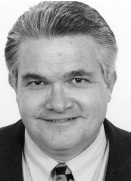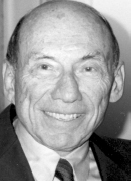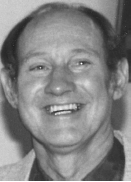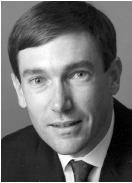JCO Survey of Orthodontic Staff Job Satisfaction
Skilled and personable staff members are critical to the success of any orthodontic practice. Once the best people are found and they are properly trained, the orthodontist's next challenge is to retain them. The staff's job satisfaction may ultimately determine how long they stay in the practice and, thus, have an impact on how well the practice treats patients and performs financially.
To find out which job-related factors are most important to orthodontic staff members, and to compare the staff's perceptions with those of the orthodontists who employ them, JCO surveyed 1,025 randomly selected U.S. practices. A questionnaire for the orthodontist and a similar questionnaire for the staff was mailed to each practice on Dec. 1, 2004. Respondents were instructed to make as many copies of the staff questionnaire as needed for every full-time employee in the practice, and to return the forms independently to JCO.
Demographics
Similar articles from the archive:
- Win-Win Staff Compensation September 1995
- ORTHODONTIC OFFICE DESIGN Staff Amenities October 1992
- Huddle Up with Your Staff March 1992
A total of 149 replies were received from orthodontists, for a response rate of 14.5%. Staff members returned 567 questionnaires. Because the responses were anonymous, no attempt was made to relate individual orthodontists' answers to those of their own staff. The data were entered on computer by an independent company and analyzed using the Statistical Package for the Social Sciences.
The orthodontists who answered the survey were a mean 50.8 years old, with 20.7 years in practice and 7.3 full-time employees (Table 1). The demographics were similar to those of the 2003 JCO Orthodontic Practice Study, except that more than 15% of the respondents to the present survey were female. Staff members, who were almost exclusively female, were a mean 37.9 years old and had been employed in orthodontics for 10.2 years--7.7 of those in their current offices. The staff members represented slightly larger practices than the orthodontists did, with an average of 8.7 full-time employees. Roughly a third of the staff worked in the operatory, but so many indicated multiple responsibilities that it was impossible to divide them by job classification for further analysis.
Job Satisfaction Factors
Both orthodontists and staff members were asked to rate various factors as "very important", "somewhat important", or "not important" in terms of job satisfaction (Table 2).
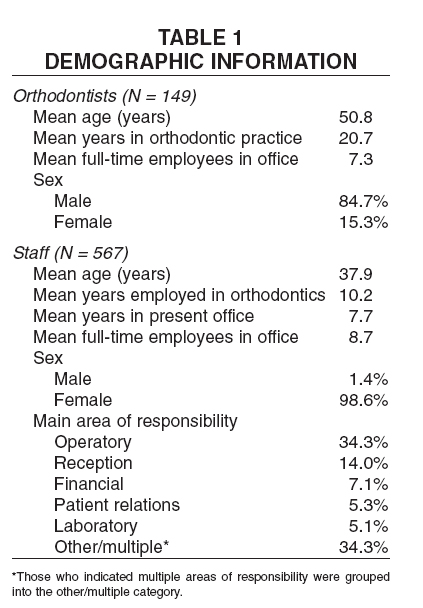
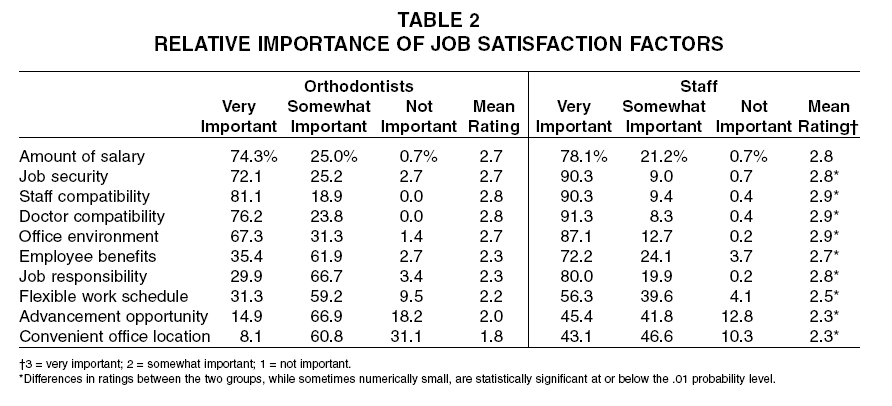
Each participant also identified the one factor that he or she felt was most important (Table 3). It should be emphasized that the orthodontists were asked to respond based on their perception of their staff members' opinions, rather than their own personal beliefs.
Salary was rated the single most important factor by both groups and was the only item for which the difference in ratings was not statistically significant. Although 39.3% of the orthodontists believed salary was the most important single consideration for their employees, only 23.8% of the staff members thought it was the most important.
The next most important single factors for the staff were job security and doctor compatibility. The orthodontists placed those items behind office environment and staff compatibility. Overall, a much higher percentage of staff members rated each item as "very important" than the orthodontists did; the doctors were more likely to consider the same factors "somewhat important".
Employee Benefits
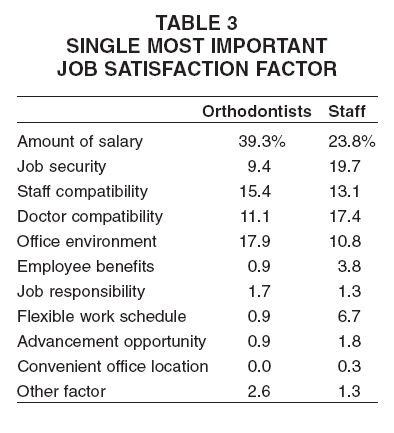
The same pattern held true for employee benefits, with staff members significantly more likely to rate each benefit as "very important"(Table 4). Both groups saw paid vacation and holidays as more important than the other benefits listed. Staff members placed retirement plans ahead of medical insurance, however, while orthodontists ranked those benefits in the opposite order. The greatest disparities in mean ratings between the two groups were found for retirement plan, dental insurance, and continuing education.
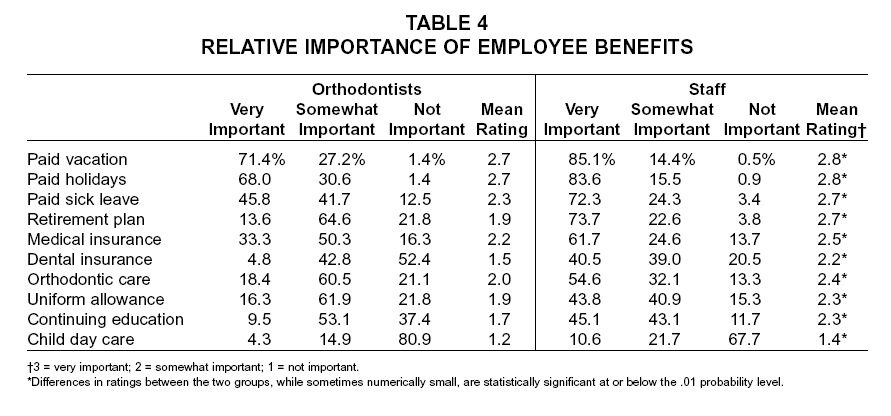
A significantly higher percentage of staff members said they would like to choose benefits from a cafeteria-style list than the orthodontists believed would be the case (Table 5). Conversely, a significantly higher percentage of orthodontists thought their staff members would accept benefits in lieu of salary than the percentage of staff who agreed.
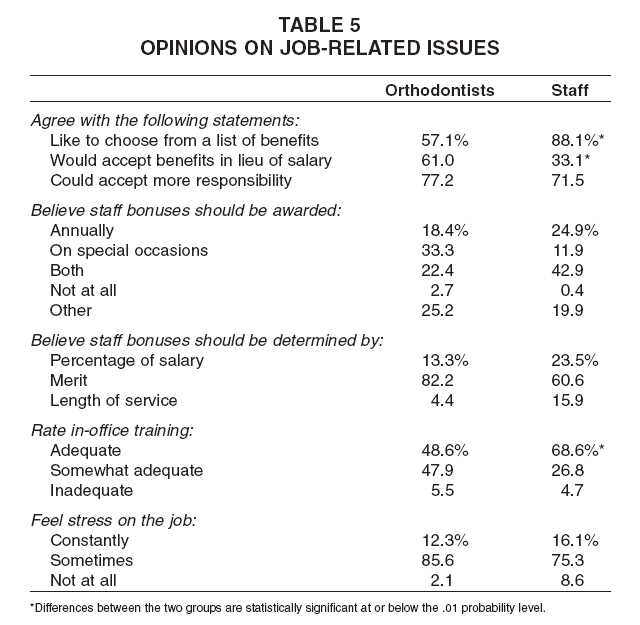
Other Job-Related Issues
A relatively equal percentage of orthodontists and staff--more than 70%--said that staff members could accept more responsibility (Table 5). While the orthodontists were more likely to believe that bonuses should be awarded on special occasions only, the staff felt they should be offered either annually or both annually and on special occasions. Staff members were also more likely to think that bonuses should be based on percentage of salary or length of service, whereas more than 80% of the orthodontists maintained they should be based on merit. Eighteen orthodontists and 34 staff members indicated that bonuses should be based on performance or production, and a number of respondents wrote in shorter intervals for paying bonuses, ranging from biannually to as often as weekly, with monthly the most common interval.
Staff members rated their in-office training as significantly better than the orthodontists did, although few of either group thought their training was inadequate.
More than three-fourths of each group believed staff members sometimes felt stress on the job, but the staff were slightly more likely than the orthodontists to say they always or never felt stress. Both groups cited overbooking and staff friction as the most important factors contributing to stress (Table 6). The staff members, however, rated doctor friction, inadequate training, home-office conflict, and emergencies as significantly more important than the orthodontists did.
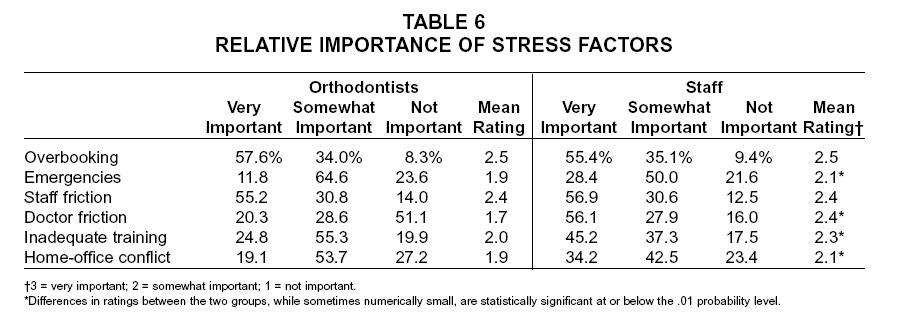
Other stress-causing factors listed by the orthodontists included non-compliant patients, a lack of busyness, and staff absences, along with the following:
- "Occasional parents with selfish, hot-headed attitudes."
- "Hygienists and general dentists can cause undue stress."
- "[Staff] not paying attention to systems in place; wasting time; not being organized."
- "Lack of initiative; inconsistent staff performance."
- "I think organizational development is the most important issue facing our practice. The team member developing trust in the organization and congruence with the core values seems to me to be dependent on the leader."
- "There are two kinds of people in life: people who like their job and people who don't work here anymore."
Stress factors listed by staff members included:
- "Unscheduled procedures; frequent repositioning, sometimes on same teeth after final wires are placed. Makes office look incompetent."
- "The doctor doesn't back us up on his office policy we enforce with patients."
- "Phone too busy--no voice mail!"
- "Division of work is a problem. Some have a lot more than others for similar pay."
- "Office troublemakers."
- "Racial comments."
- "Conflict with staff in adjoining office."
- "Favoritism is very bad here."
- "Doctor's respect level for assistants."
- "[Annual staff] reviews are not being done. I would like the doctor to take more responsibility in that area."
- "Communication!!"
- "We belong to too many discounted insurance plans. I think we would benefit by deleting the really low-fee plans. In the long run things would run smoother, and it would not make a difference financially."
- "I should not be discriminated against due to age concerning my health coverage. I have invested 22 years in a very successful practice, and my medical reimbursement doesn't even cover hospitalization."
Several staff members also listed lack of advancement opportunity as a stress-related consideration, and there were two lengthy comments about the problems of staff working alongside the orthodontist's spouse--one from a staff member and one from a spouse.
Factors Related to Number of Years in Orthodontics
The importance ratings of the factors listed in Tables 2, 4, and 6 were broken down by the orthodontists' number of years in practice and by the staff members' number of years employed in orthodontics. No significant differences were found among the orthodontist groups, which could be partly due to the smaller sample size.
Among the staff, those who had been employed for 10 years or fewer were significantly more likely than those with longer tenures to consider advancement opportunities important to their job satisfaction (Table 7). The younger employees also placed significantly more importance on child-care benefits (Table 8).
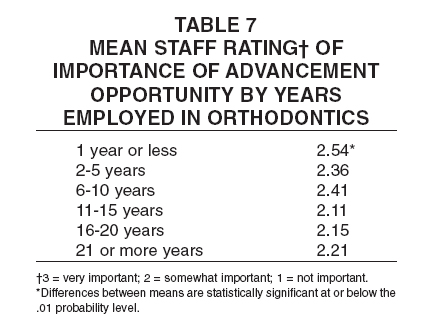
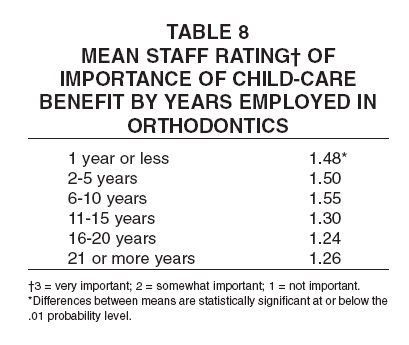
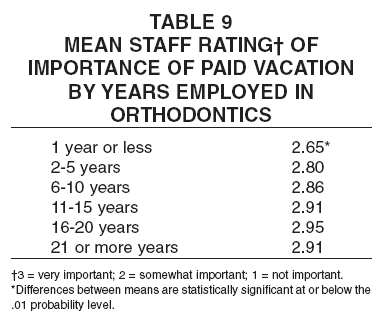
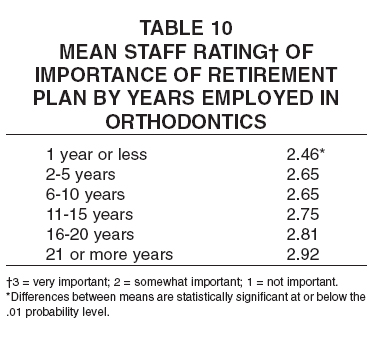
Conclusion
Orthodontists may have the best interests of their employees at heart, but may not always know what their staff members think about the relative importance of job-satisfaction factors and benefits. This survey shows that orthodontists tend to focus on strictly work-related issues such as salary, job performance, the office environment, and staff relationships, while their staff members may be more concerned about long-term, outside-life-related issues such as job security, insurance, and retirement planning--as well as their relationships with their employers, which have a substantial impact on their security.
Orthodontists may want to consider conducting similar surveys within their own offices, guaranteeing anonymity in some way to ensure candid responses. The results would allow them to tailor their employment policies and benefits to suit their present employees. In many cases, there would be little or no economic impact, but staff members would almost certainly be happier and, therefore, more likely to remain with their practices.


